初中英语仁爱版八年级上册知识点梳理(共计59页)
- 格式:doc
- 大小:1.11 MB
- 文档页数:44
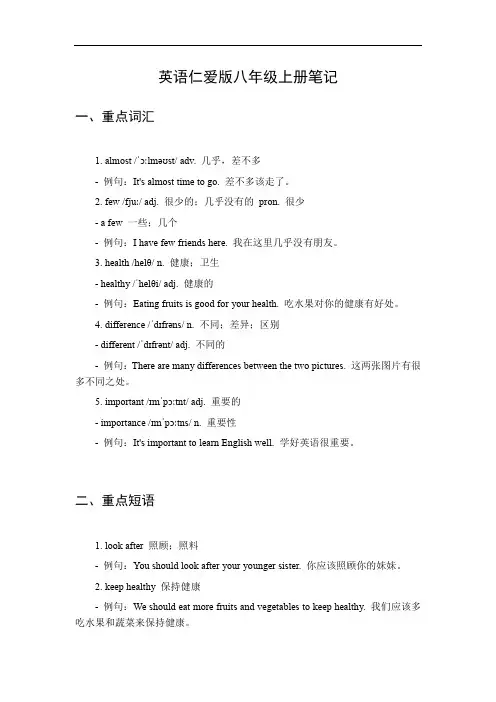
英语仁爱版八年级上册笔记一、重点词汇1. almost /ˈɔːlməʊst/ adv. 几乎,差不多-例句:It's almost time to go. 差不多该走了。
2. few /fjuː/ adj. 很少的;几乎没有的pron. 很少- a few 一些;几个-例句:I have few friends here. 我在这里几乎没有朋友。
3. health /helθ/ n. 健康;卫生- healthy /ˈhelθi/ adj. 健康的-例句:Eating fruits is good for your health. 吃水果对你的健康有好处。
4. difference /ˈdɪfrəns/ n. 不同;差异;区别- different /ˈdɪfrənt/ adj. 不同的-例句:There are many differences between the two pictures. 这两张图片有很多不同之处。
5. important /ɪmˈpɔːtnt/ adj. 重要的- importance /ɪmˈpɔːtns/ n. 重要性-例句:It's important to learn English well. 学好英语很重要。
二、重点短语1. look after 照顾;照料-例句:You should look after your younger sister. 你应该照顾你的妹妹。
2. keep healthy 保持健康-例句:We should eat more fruits and vegetables to keep healthy. 我们应该多吃水果和蔬菜来保持健康。
3. be different from 与……不同-例句:My bike is different from yours. 我的自行车和你的不同。
4. a few days later 几天后-例句:He came back a few days later. 几天后他回来了。
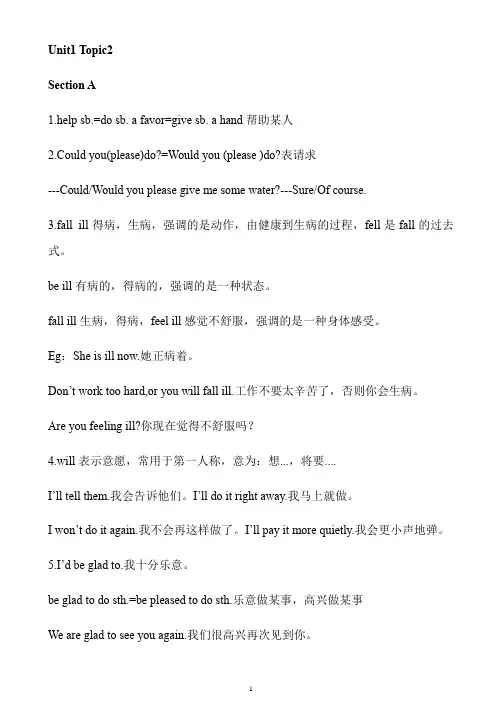
Unit1 Topic2Section A1.help sb.=do sb. a favor=give sb. a hand帮助某人2.Could you(please)do?=Would you (please )do?表请求---Could/Would you please give me some water?---Sure/Of course.3.fall ill得病,生病,强调的是动作,由健康到生病的过程,fell是fall的过去式。
be ill有病的,得病的,强调的是一种状态。
fall ill生病,得病,feel ill感觉不舒服,强调的是一种身体感受。
Eg:She is ill now.她正病着。
Don’t work too hard,or you will fall ill.工作不要太辛苦了,否则你会生病。
Are you feeling ill?你现在觉得不舒服吗?4.will表示意愿,常用于第一人称,意为:想...,将要....I’ll tell them.我会告诉他们。
I’ll do it right away.我马上就做。
I won’t do it again.我不会再这样做了。
I’ll pay it more quietly.我会更小声地弹。
5.I’d be glad to.我十分乐意。
be glad to do sth.=be pleased to do sth.乐意做某事,高兴做某事We are glad to see you again.我们很高兴再次见到你。
6.Would/Do you mind+doing sth.?你介意做某事吗?/如果...可以吗?/请你...好不好?常用来表示委婉的请求,或用来表示希望得到对方的许可。
回答时如果表示“可以”,要说Not at all./Of course not./Certainly not./No problem.当然不介意。
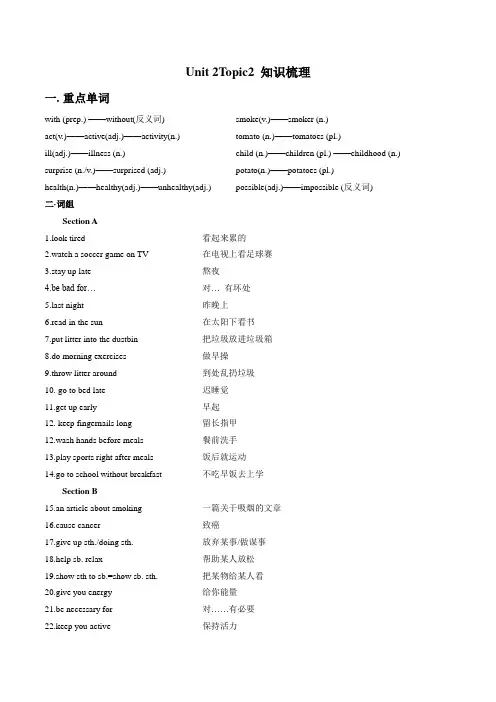
Unit 2Topic2 知识梳理一.重点单词with (prep.) ——without(反义词) smoke(v.)——smoker (n.)act(v.)——active(adj.)——activity(n.) tomato (n.)——tomatoes (pl.)ill(adj.)——illness (n.) child (n.)——children (pl.) ——childhood (n.) surprise (n./v.)——surprised (adj.) potato(n.)——potatoes (pl.)health(n.)——healthy(adj.)——unhealthy(adj.) possible(adj.)——impossible (反义词) 二·词组Section A1.look tired 看起来累的2.watch a soccer game on TV 在电视上看足球赛3.stay up late 熬夜4.be bad for… 对… 有坏处st night 昨晚上6.read in the sun 在太阳下看书7.put litter into the dustbin 把垃圾放进垃圾箱8.do morning exercises 做早操9.throw litter around 到处乱扔垃圾10. go to bed late 迟睡觉11.get up early 早起12. keep fingernails long 留长指甲12.wash hands before meals 餐前洗手13.play sports right after meals 饭后就运动14.go to school without breakfast 不吃早饭去上学Section B15.an article about smoking 一篇关于吸烟的文章16.cause cancer 致癌17.give up sth./doing sth. 放弃某事/做谋事18.help sb. relax 帮助某人放松19.show sth to sb.=show sb. sth. 把某物给某人看20.give you energy 给你能量21.be necessary for 对……有必要22.keep you active 保持活力23.take a walk 散步Section C24.be careful (not) to do sth… 小心(不)要做做谋事25.cause illness/diseases 引发疾病26.take care of sb. well= take good care of sb.照顾好某人27.force sb. to do sth. 强迫某人做谋事28.during one’s childhood 在某人童年时期29.make sb. do sth. 使某人做谋事30.get mad 生气31.be surprised to do sth. 做谋事感到很吃惊32.as soon as… 一…就…33.during his childhood 在他的童年期间34.by chance 偶然地Section D35.as soon as possible 尽快36.not only… but (also)… 不仅…而且…37.tell sb. (not) to do sth. 告诉某人(不)要做谋事38.in fact 实际上,事实上三.重点句子1. I’m sorry to hear that. 听到这个我感到很抱歉。
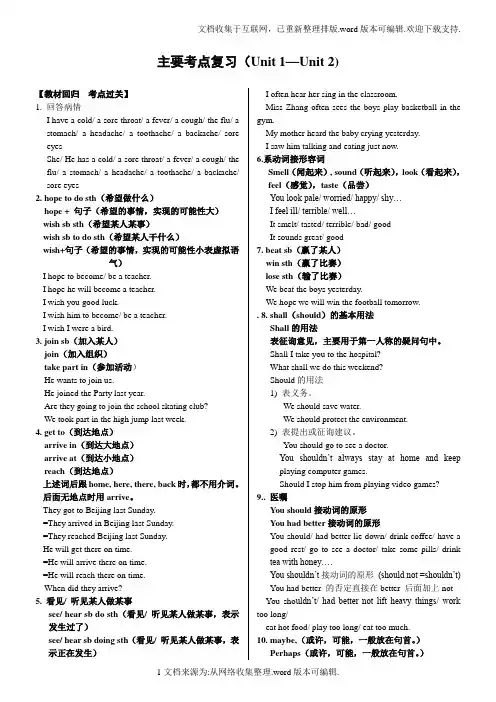
主要考点复习(Unit 1—Unit 2)【教材回归考点过关】1. 回答病情I have a cold/ a sore throat/ a fever/ a cough/ the flu/ astomach/ a headache/ a toothache/ a backache/ sore eyesShe/ He has a cold/ a sore throat/ a fever/ a cough/ the flu/ a stomach/ a headache/ a toothache/ a backache/ sore eyes2. hope to do sth(希望做什么)hope + 句子(希望的事情,实现的可能性大)wish sb sth(希望某人某事)wish sb to do sth(希望某人干什么)wish+句子(希望的事情,实现的可能性小表虚拟语气)I hope to become/ be a teacher.I hope he will become a teacher.I wish you good luck.I wish him to become/ be a teacher.I wish I were a bird.3. join sb(加入某人)join(加入组织)take part in(参加活动)He wants to join us.He joined the Party last year.Are they going to join the school skating club?We took part in the high jump last week.4. get to(到达地点)arrive in(到达大地点)arrive at(到达小地点)reach(到达地点)上述词后跟home, here, there, back时,都不用介词。
后面无地点时用arrive。
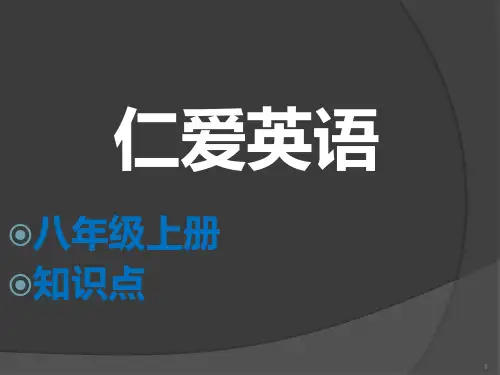
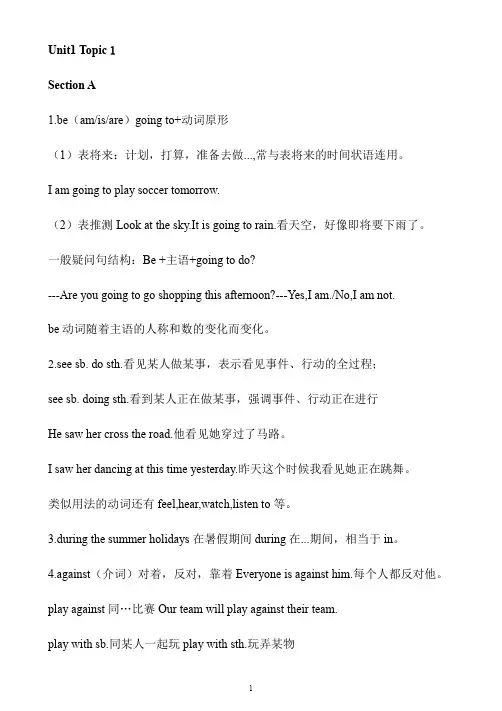
Unit1 Topic1Section A1.be(am/is/are)going to+动词原形(1)表将来:计划,打算,准备去做...,常与表将来的时间状语连用。
I am going to play soccer tomorrow.(2)表推测Look at the sky.It is going to rain.看天空,好像即将要下雨了。
一般疑问句结构:Be +主语+going to do?---Are you going to go shopping this afternoon?---Yes,I am./No,I am not.be动词随着主语的人称和数的变化而变化。
2.see sb. do sth.看见某人做某事,表示看见事件、行动的全过程;see sb. doing sth.看到某人正在做某事,强调事件、行动正在进行He saw her cross the road.他看见她穿过了马路。
I saw her dancing at this time yesterday.昨天这个时候我看见她正在跳舞。
类似用法的动词还有feel,hear,watch,listen to等。
3.during the summer holidays在暑假期间during在...期间,相当于in。
4.against(介词)对着,反对,靠着Everyone is against him.每个人都反对他。
play against同…比赛Our team will play against their team.play with sb.同某人一起玩play with sth.玩弄某物I often play with my friends. The cat is playing with a ball.against作为介词,还有“紧靠;倚”的意思。
Eg:Put the piano there,against the wall.把钢琴放在那,紧靠着墙。
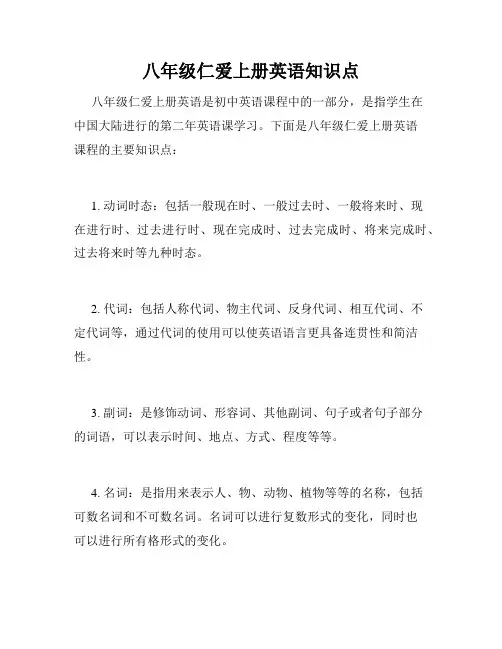
八年级仁爱上册英语知识点八年级仁爱上册英语是初中英语课程中的一部分,是指学生在中国大陆进行的第二年英语课学习。
下面是八年级仁爱上册英语课程的主要知识点:1. 动词时态:包括一般现在时、一般过去时、一般将来时、现在进行时、过去进行时、现在完成时、过去完成时、将来完成时、过去将来时等九种时态。
2. 代词:包括人称代词、物主代词、反身代词、相互代词、不定代词等,通过代词的使用可以使英语语言更具备连贯性和简洁性。
3. 副词:是修饰动词、形容词、其他副词、句子或者句子部分的词语,可以表示时间、地点、方式、程度等等。
4. 名词:是指用来表示人、物、动物、植物等等的名称,包括可数名词和不可数名词。
名词可以进行复数形式的变化,同时也可以进行所有格形式的变化。
5. 形容词:用来描述,区分同类事物的形容词,包括比较级、最高级等形式,同时还可以进行名词修饰的作用。
6. 冠词:是指英语表达中最基本的语法符号之一,主要用来指示所描述的名词的身份和数量。
7. 介词短语:用来描述事物在时间、地点等方面的关系,主要由介词和名词组成。
8. 从句:是构成英语语言中复杂句式的关键,包括定语从句、主语从句、宾语从句等等。
9. 句型:包括陈述句、疑问句、祈使句和感叹句等。
10. 短语动词:短语动词是指由主要动词加上一些小品词构成的动词短语,它可以为英语语言提供更多的语法表达和表达深度。
11. 翻译:英语学习的一个重要环节是翻译,可以通过其来提高听、读、写、说等四种语言技能。
以上内容是八年级仁爱上册英语课程的主要知识点,希望可以给正在学习中的同学提供帮助,让他们可以更好地掌握这门语言。
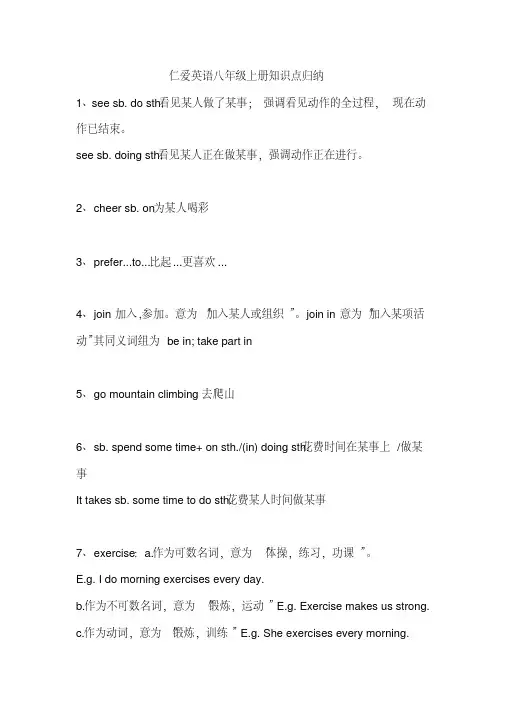
仁爱英语八年级上册知识点归纳1、see sb. do sth.看见某人做了某事;强调看见动作的全过程,现在动作已结束。
see sb. doing sth.看见某人正在做某事,强调动作正在进行。
2、cheer sb. on 为某人喝彩3、prefer...to...比起...更喜欢...4、join 加入,参加。
意为“加入某人或组织”。
join in意为“加入某项活动”其同义词组为be in; take part in5、go mountain climbing去爬山6、sb. spend some time+ on sth./(in) doing sth.花费时间在某事上/做某事It takes sb. some time to do sth.花费某人时间做某事7、exercise:a.作为可数名词,意为“体操,练习,功课”。
E.g. I do morning exercises every day.b.作为不可数名词,意为“锻炼,运动” E.g. Exercise makes us strong.c.作为动词,意为“锻炼,训练” E.g. She exercises every morning.8、be good at; do well in 擅长...;在...做的好be not good at; be weak in; do badly in 在...方面薄弱9、 the high jump跳高;the long jump 跳远10、all over the world; throughout the world; around the world; the whole world 全世界11、be good for对...有益/有好处;反义词短语be bad for12、keep fit/healthy 保持健康13、one of+ the+最高级+可数名词的复数,表示“最...的之一”14、fall ill生病15、be glad to...乐意做...16、do one’s best=try one’s best意为“尽力,努力”17、be angry with sb.生某人的气18、keep doing sth.继续做某事在某人的帮助下19、with the help of sb.=with one’s help以便,为了”so...that...如此...以至于...20、so that “21、more and more 越来越22、sports meet 运动会23、stand for 代表24、in the future 在将来25、What’s wrong with you?其同义句为What’s the matter/trouble with you?你怎么啦?26、I’m sorry +动词不定式,“为...感到抱歉/难过”27、have a cold感冒;have a cough咳嗽;have a headache头痛;havea stomachache胃痛,肚子痛28、at night在夜里;in the evening在傍晚29、have a rest=take a rest休息30、feel like doing sth.=would like to do sth.想做某事31、too much修饰不可数名词,还可用来修饰动词too many修饰可数名词的复数形式很,太”,用来修饰形容词或副词much too “32、lie down 躺下33、something new 新的事something, anything, nothing等不定代词,被形容词修饰时,形容词谓语其后作后置定语34、three times a day一天三次35、have an accident发生一场事故36、take care of+名词/代词,意为“照顾,照看,保管”37、return to sp.返回某地。
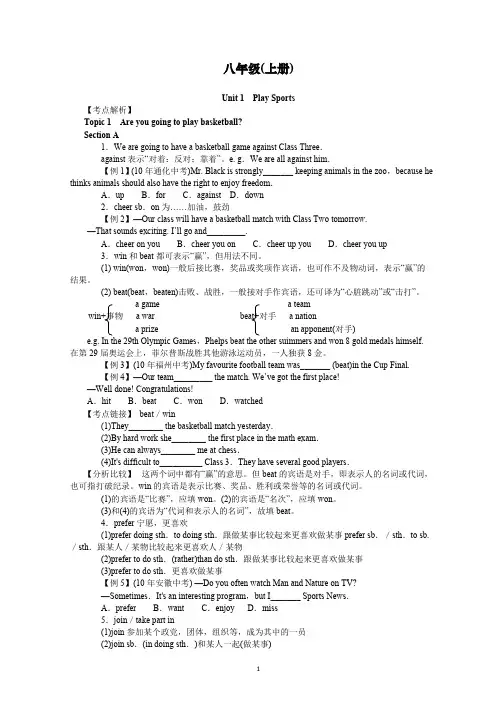
矿产资源开发利用方案编写内容要求及审查大纲
矿产资源开发利用方案编写内容要求及《矿产资源开发利用方案》审查大纲一、概述
㈠矿区位置、隶属关系和企业性质。
如为改扩建矿山, 应说明矿山现状、
特点及存在的主要问题。
㈡编制依据
(1简述项目前期工作进展情况及与有关方面对项目的意向性协议情况。
(2 列出开发利用方案编制所依据的主要基础性资料的名称。
如经储量管理部门认定的矿区地质勘探报告、选矿试验报告、加工利用试验报告、工程地质初评资料、矿区水文资料和供水资料等。
对改、扩建矿山应有生产实际资料, 如矿山总平面现状图、矿床开拓系统图、采场现状图和主要采选设备清单等。
二、矿产品需求现状和预测
㈠该矿产在国内需求情况和市场供应情况
1、矿产品现状及加工利用趋向。
2、国内近、远期的需求量及主要销向预测。
㈡产品价格分析
1、国内矿产品价格现状。
2、矿产品价格稳定性及变化趋势。
三、矿产资源概况
㈠矿区总体概况
1、矿区总体规划情况。
2、矿区矿产资源概况。
3、该设计与矿区总体开发的关系。
㈡该设计项目的资源概况
1、矿床地质及构造特征。
2、矿床开采技术条件及水文地质条件。
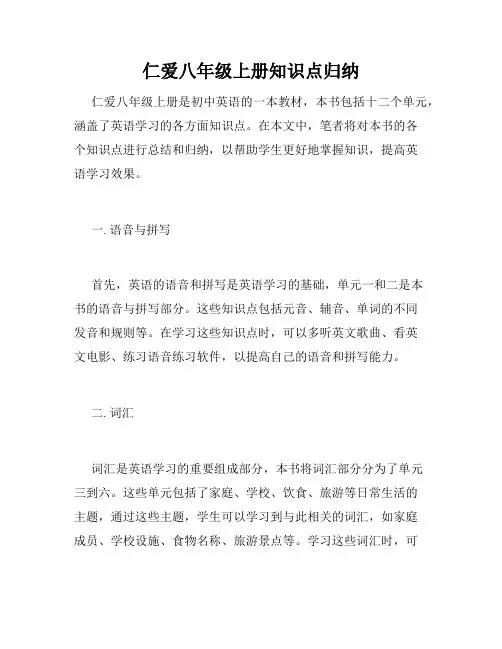
仁爱八年级上册知识点归纳仁爱八年级上册是初中英语的一本教材,本书包括十二个单元,涵盖了英语学习的各方面知识点。
在本文中,笔者将对本书的各个知识点进行总结和归纳,以帮助学生更好地掌握知识,提高英语学习效果。
一. 语音与拼写首先,英语的语音和拼写是英语学习的基础,单元一和二是本书的语音与拼写部分。
这些知识点包括元音、辅音、单词的不同发音和规则等。
在学习这些知识点时,可以多听英文歌曲、看英文电影、练习语音练习软件,以提高自己的语音和拼写能力。
二. 词汇词汇是英语学习的重要组成部分,本书将词汇部分分为了单元三到六。
这些单元包括了家庭、学校、饮食、旅游等日常生活的主题,通过这些主题,学生可以学习到与此相关的词汇,如家庭成员、学校设施、食物名称、旅游景点等。
学习这些词汇时,可以结合生活实践,如与家人朋友进行英语交流,做一些与英语相关的阅读、写作和口语练习等。
三. 语法语法是英语学习中重要的一环,本书将语法部分分为了单元七到十。
这些知识点包括了时态、被动语态、条件句、虚拟语气等。
在学习这些知识点时,可以结合语法书籍、英语语法网站等资源进行学习,同时要多进行语言实践,通过阅读、写作等方式,掌握语法知识,提高英语水平。
四. 阅读与写作阅读和写作是英语学习中重要的组成部分,本书将阅读和写作部分分为了单元十一和十二。
这些单元包括了不同类型的阅读材料,如小说、新闻报道、庆典、活动等。
同时还有写作训练,如书信、日记、演讲稿等。
学生通过阅读和写作的学习,可以提高阅读理解和写作能力,同时更好地了解英语国度的文化和习俗。
五. 归纳总结除了以上知识点之外,英语语言学习还涉及到口语、听力、文化等方面。
在学习这些知识点时,学生应该注重细节,注重实践,多加思考和总结,以提高英语学习效果。
总之,仁爱八年级上册给学生提供了扎实的英语基础,其中的知识点也是未来学习的基础。
通过对这些知识点的系统学习和实践,可以使学生更好地掌握语言知识,提高英语水平。
八年级(上册)Unit 1 Play Sports【考点解析】Topic 1 Are you going to play basketball?Section A1.We are going to have a basketball game against Class Three.against表示“对着:反对;靠着”2.cheer sb.on为……加油,鼓劲3.win和beat都可表示“赢”,但用法不同。
(1) win(won,won)一般后接比赛,奖品或奖项作宾语,也可作不及物动词,表示“赢”的结果。
(2) beat(beat,beaten)击败、战胜,一般接对手作宾语,还可译为“心脏跳动”或“击打”。
a game a teamwin+事物 a war beat+对手 a nationa prize an apponent(对手)4.prefer宁愿,更喜欢(1)prefer doing sth.to doing sth.跟做某事比较起来更喜欢做某事prefer sb./sth.to sb./sth.跟某人/某物比较起来更喜欢人/某物(2)prefer to do sth.(rather)than do sth.跟做某事比较起来更喜欢做某事(3)prefer to do sth.更喜欢做某事5.join/take part in(1)join参加某个政党,团体,组织等,成为其中的一员(2)join sb.(in doing sth.)和某人一起(做某事)(3)join in=take partin参加某项活动Section B1.play for a team为某队效力be in/on the team在某队打球2.dream作名词,“梦,梦想”。
e.g.my dream job也可作动词dream of/about sth./doing sth.3.“one of the+形容词最高级+名词的复数”意思是“最……之一”。
4.break the record打破记录5.in the 2008 Beijing Olympics在2008年北京奥运会中。
“在……比赛中”用ine.g.in the race/in the basketball game6.give up放弃。
注意应该把介词放在中间。
e.g.give it up,give up doing sth.放弃做某事。
7.What a Shame=What a pity真遗憾!Section C1.spend/cost/pay/take(1)spend作“花费”之意时,指花费时间/精力/财力在某事或某物上,主语是人。
(2)cost主要指花费金钱/时间/劳力/精力等。
主语是某物或某事。
其结构是sth.costs sb….(3)pay sb,酬谢某人,pay…for…可等同于spend…on…,或用cost作同义句转换。
(4)take一般指花费时间,其主语是名词或动名词,经常用it作形式主语。
2.do exercise=play sports做运动,锻炼3.There be句型的将来时结构为There is/are going to be或There will be。
注意在There be句型中不能出现表示“有”的have和has。
4.the high jump跳高the long jump跳远5.Sure (1)be sure that+从句e.g.I am sure that he is right.(2)sb.be sure to do sth.某人一定会做某事。
强调说话人的语气。
(3)be sure of/about sth./doing sth.“确信”,表示主语对……有把握。
(4)用在祈使句里Be sure(not)to do sth.一定(不)做某事e.g.Be sure to come here early.6.make的用法。
(1)make sb.do sth.使某人做某事。
被动语态中要还原to。
(2)“make sb./sth.+形容词”使某人或某物处于某种状态。
(3)make sth.for sb.—make sb.sth.为某人制作……7.be good for“对……有益”,反义词组是be bad for“对……有害”。
8.keep healthy=keep fit保持健康Section D1.play against跟……进行比赛play with/play against/play for play with玩耍,游戏,玩乐,与……玩耍。
play against同……比赛。
play for为……效力。
2.leave…for…离开某地去某地leave for=set off for出发去某地.3.一般将来时(1)含义:表示将来某个时间要发生的动作或是存在的状态,也表示将来经常或反复发生的动作,常与表示将来的时间状语连用,如:tomorrow,soon,later on,next time(week,month,year,Sunday…)等。
(2)结构为be going to do sth.或will do sth.。
There be句型的将来时结构为There is/are going to be或There will be。
注意在There be句型中不能出现表示“有”的have/has。
(3)表示位置移动的动词go, come,leave,fly,start等可以用现在进行时表示将要发生的事。
其中go 和come一定要用现在进行时表示将来。
【例19】(10年河北中考)This term________ over.The summer vacation is coming in two weeks.A.is B.was C.has been D.will be【例20】(10年重庆中考)If you___________ to the 2010 Shanghai Expo next week,I will go with you.A.go B.has gone C.will go D.are going【考点解析】Topic 2 Would you mind passing me some water?Section A1.would/could/will you(please)do sth.“请你做……好吗?”表示委婉请求对方做某事,否定结构是would/could/will you(please)not do sth.。
e.g.Would you please not play the piano loudly?2.fall ill“生病”,be ill“生病的”,强调一种状态。
feel ill“感觉不舒服”,强调一种身体感受。
fall down 摔倒,跌倒。
3.mind的用法(1)作动词,表示“介意”,常用于疑问句或否定句中。
其结构是mind sb./sth./doing sth.对would you mind sb./sb.'s doing sth.及“would you mind if+从句”的回答,如果是表达“会介意”,可用Yes,you'd better not./I am sorry but I do.如果表达“不会介意”,可用No,not at all./Never mind./It doesn't matter./No,of course not.(2)用于提出建议。
Would you mind doing sth./would you mind not doing sth? 对Would you mind doing sth.的回答可以用Of course not,I will do it right away./Sorry.I will do it right away.对would you mind not doing sth.的回答可以用Sorry,I won't do it again./I'm sorry about that.(4)作名词,“思想”。
set one's mind to do sth./on sth.专注于做某事4.be glad/happy to do sth.乐意做某事5.practice sth./doing sth.练习做某事Section B1.be always doing sth.老是……,含有抱怨的感情色彩。
2.careless形容词,反义词是careful。
carelessly副词,反义词是carefully.3.chance机会have a chance to do sth.有机会做某事get a chance to do sth.得到一个机会做某事4.What do you mean by sth./doing sth.?=What's the meaning of sth./doing sth.?5.shout at sb.朝某人喊叫,含有生气或气愤的感情。
shout to sb.朝某人喊叫,只是为了使对方听到,没有感情色彩。
6.fight with sb.=have a fight with sb.与某人打架7.be angry with sb.意为“生某人的气”,如:【链接】(1) be angry at 对某人的言行感到气愤,(2) be angry about sth. 对某事感到生气,如:8.do one's best to do sth.=try to do sth.尽力做某事9.say sorry/hello/goodbye to sb.向某人道歉/问候,/道10.be/feel sorry for/to do为……而抱歉(难过)11.keep的用法(1) keep sb.doing sth.使某人一直做某事(2)“keep sb./sth.+宾补+adj.”使某人/某物处于某种状态(3)“keep sb./sth.+宾补+adv.”使某人/某物处于某种状态(4)keep doing sth.继续不断做某事e.(5)“keep+表语”,表示保持/继续(处于某种状态) e.g.keep fit/healthy(6)赡养e.g.My father keeps a big family.(7)保存,保留e.g.How long can I keep the book?12.turn down调低音量turn up调高音量turn on打开turn off关上注意代词都要放在中间。
【分析比较】turn on“打开(水龙头、电视、收音机、灯、煤气等)”turn off“关掉(水龙头、电视、收音机、灯、煤气等)”。